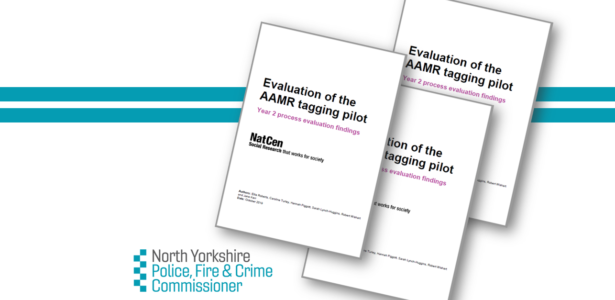Positive results for sobriety tag pilot across North Yorkshire, Lincolnshire and Humberside

The scheme, part funded by Julia Mulligan, North Yorkshire Police, Fire and Crime Commissioner, used the latest alcohol monitoring technology, also known as ‘sobriety tags’, to tackle alcohol associated offending.
Julia Mulligan, North Yorkshire’s Police, Fire and Crime Commissioner, said:
“This has proved to be a successful pilot, with many lessons learned along the way. We know alcohol can play a key part in offending for some people, and this appears to have been a positive intervention – reducing offending markedly among those wearing tags. This appears to have been particularly true of domestic violence incidents, something which I hugely welcome given my commitment to reduce violence against women and girls.
“There were areas where the pilot was less successful, with simply not enough tags being used in North Yorkshire compared to elsewhere. If we are to roll this programme out in the longer term we would need to learn those lessons and make sure we improved our partnership working, making it clear to everyone involved the benefits these tags can bring.
“These tags have the opportunity to make North Yorkshire a safer place, but there is more work to do and I look forward to seeing the further analysis.”
The Humberside, Lincolnshire and North Yorkshire Alcohol Abstinence and Monitoring Requirement pilot was carried out for two years from June 2017 until the sentencing powers ended in April 2019.
The project was implemented by a partnership including the Offices of the Police and Crime Commissioners for North Yorkshire, Humberside and Lincolnshire.
Humberside, Lincolnshire & North Yorkshire Community Rehabilitation Company had responsibility for managing the scheme with representation from Her Majesty’s Courts and Tribunals Service, the Crown Prosecution Service, Her Majesty’s Prison and Probation Service and the Ministry of Justice.
Magistrates’ and Crown Courts were able to require offenders to wear the tags by executing an Alcohol Abstinence Monitoring Requirement (AAMR) as part of community or suspended sentence imposed on those who commit crimes while under the influence of alcohol.
The ankle bracelets, which detect alcohol levels, alerted the authorities when the wearer had breached the abstinence order and the offender was returned to court.
The review of the project, which also took place in Humberside and Lincolnshire, carried out by the National Centre for Social Research (NatCen) noted that:
- Over the course of the pilot, 226 individuals were issued the AAMR order. These individuals were predominantly white (98%) and male (88%). Almost all (96%) wearers were under 50 years old.
- Half (52%) of wearers were sentenced in Lincolnshire, one-third (33%) in Humberside and 13% in North Yorkshire at the time of receiving the AAMR order.
- Alcohol is a significant factor in offending in the pilot areas, particularly in domestic violence cases and 31% of wearers were convicted of a domestic violence offence.
- Compliance with the AAMR was high, 94% successfully completed the requirement and 97.4% of all the days monitored were free of alcohol.
The pilot was carried out in the county for two years and managed by Humberside, Lincolnshire & North Yorkshire Community Rehabilitation Company (HLNY CRC) with support from Her Majesty’s Courts and Tribunals Service, the Crown Prosecution Service, Her Majesty’s Prison and Probation Service (HMPPS) and the Ministry of Justice (MoJ).
The initial evaluation report has now been published and NatCen has now been commissioned to undertake a further study of the effect on offenders’ behaviour and reoffending rates.
Becky Bailey, Community Director for the Humberside Lincolnshire and North Yorkshire Community Rehabilitation Company, said:
“The pilot was an excellent example of partnership working and shows what can be achieved when Criminal Justice organisations collaborate to support the delivery of new interventions to reduce reoffending.
“Case managers have had feedback from offenders that probation support, together with the discipline involved in working with the requirement and alcohol tag, have helped them commit to lasting change. This is fantastic as when people make sustained and positive changes to their lives we help to reduce reoffending and prevent future victims of crime.”
Justice Minister Chris Philp MP said:
“Alcohol-fuelled crimes put a huge strain on frontline services and costs the taxpayer billions of pounds each year.
“Whilst prison will always be the right place for serious criminals, harnessing innovative technologies like alcohol tags can not only punish offenders but also help turn their lives around.
“That is why we’re committed to rolling these tags out nationwide – to reduce reoffending and ultimately create fewer victims.”
